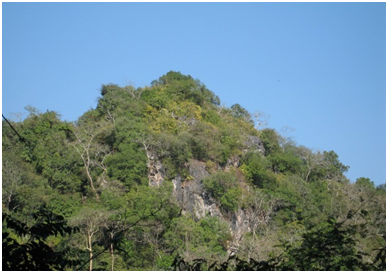Karst and non-karst forests occur in the same region in south-west China, but the soil water and mineral nutrients availability are different between the forests.
Being evergreen or deciduous are two contrasting adaptive strategies in plants for coping with seasonal drought in tropical dry forests. However, it remains unknown how the leaf functional traits of evergreen and deciduous trees differ with soil water and mineral nutrient status. Co-existing karst and non-karst forests provide a suitable opportunity to investigate that question.
Researchers from Xishuangbanna Tropical Botanical Garden (XTBG) hypothesized that differences in water use-related traits between evergreen and deciduous tree species will be more pronounced in karst forests than in non-karst forests.
The researchers compared morphological traits, nitrogen (N) and phosphorous ( P) concentrations, and gas exchange in the leaves of 21 karst forest trees with leaves from 19 tree species in a nearby non-karst forest.
They found that karst forest trees were richer in leaf P and more conservative in water use than the non-karst forest trees. Thus the karst species could realize higher C assimilation in the wet season, when soil water is limited.
Evergreen and deciduous trees differed more in leaf functional traits within the karst forest than within the nonkarst forest.
Leaf spongy mesophyll thickness was closely correlated with the leaf economic spectrum across both karst and non-karst forests, whereas leaf palisade to spongy mesophyll thickness ratio (PSR) was positively correlated with leaf stomatal conductance and negatively correlated with leaf water use efficiency only in the karst forest.
The study entitled “The contrasting leaf functional traits between a karst forest and a nearby non-karst forest in south-west China” has been published online in Functional Plant Biology.
Contact
FU Peili Ph.D
Key Laboratory of Tropical Forest Ecology, Xishuangbanna Tropical Botanical Garden, Chinese Academy of Sciences, Mengla, Yunnan 666303, China
E-mail: fpl@xtbg.org.cn

Karst forest

Non-karst forest


